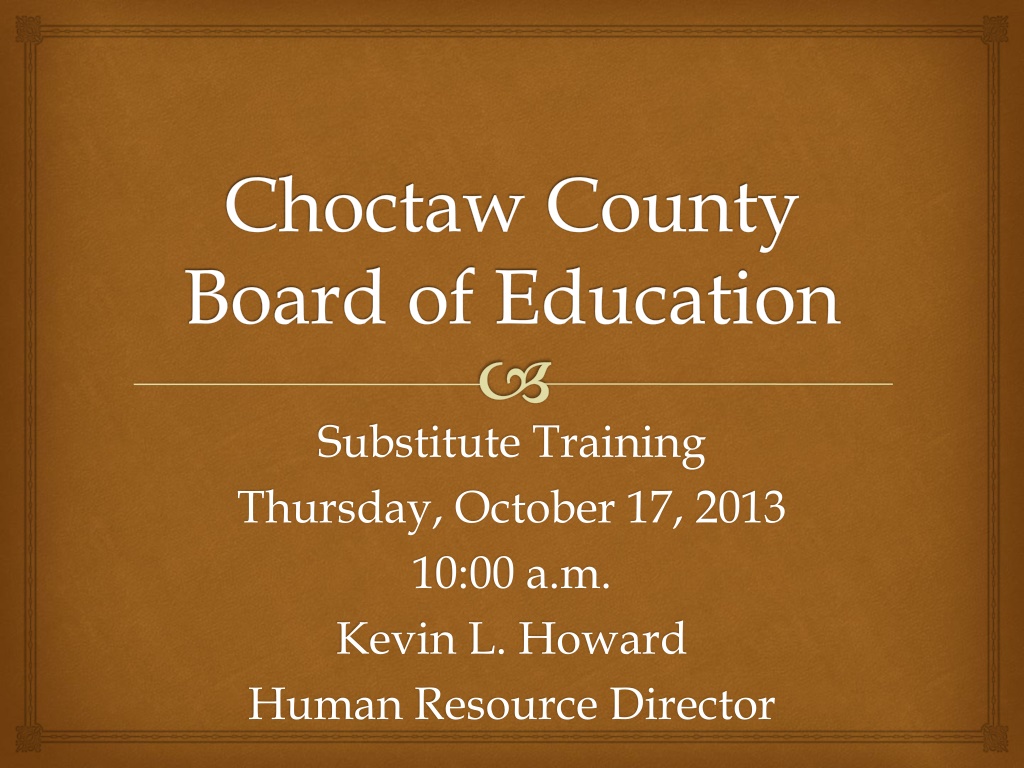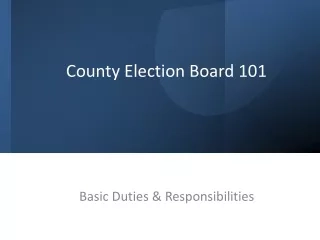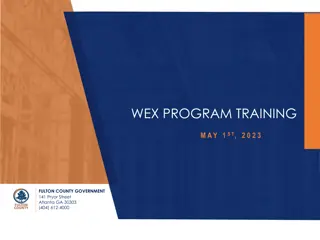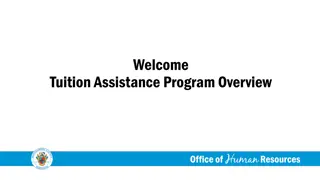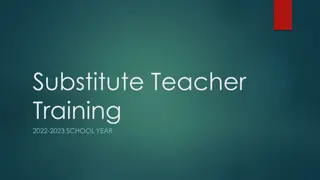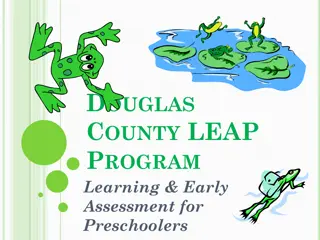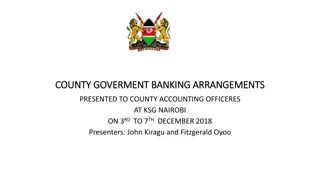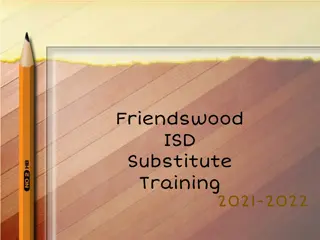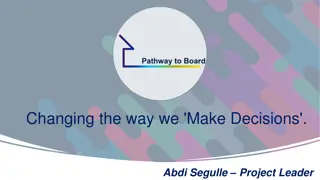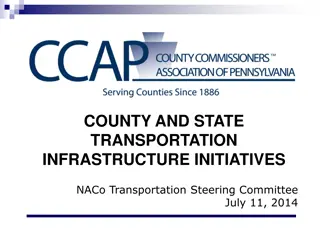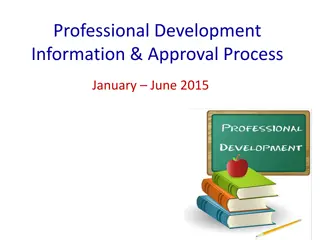Substitute Training Program for Choctaw County Board of Education
This training program by Choctaw County Board of Education aims to provide professional development for substitutes to positively impact the students. The program covers topics such as types of substitutes, pay rates, and standards of conduct. It emphasizes the importance of enjoying the challenge of subbing and includes insights from key education figures like the Human Resource Director and Superintendent.
- Substitute Training
- Education Development
- Choctaw County
- Professionalism in Education
- Education System
Download Presentation

Please find below an Image/Link to download the presentation.
The content on the website is provided AS IS for your information and personal use only. It may not be sold, licensed, or shared on other websites without obtaining consent from the author. Download presentation by click this link. If you encounter any issues during the download, it is possible that the publisher has removed the file from their server.
E N D
Presentation Transcript
Choctaw County Board of Education Substitute Training Thursday, October 17, 2013 10:00 a.m. Kevin L. Howard Human Resource Director
Administration Ms. Sue Moore Superintendent of Education
AEA Ms. Sandra Jackson UniServ Director District 23
LEA Mr. Edward Dubose Choctaw County Transportation Supervisor Mr. A. Wayne Longmire Principal of Choctaw County Elementary School Dr. Stacey P. Gill Principal of Choctaw County High School
Introductions (continued) Mr. Luke Taylor III Principal of Southern Choctaw Elementary School Dr. Leo Leddon Jr. Principal of Southern Choctaw High School Ms. Seketha Mitchell Chief School Financial Officer
Purpose The purpose of this training is to provide professional development for our substitutes, in hopes that they will have positive experiences and a meaningful impact upon the children in the Choctaw County School System.
Purpose (continued) It is particularly important to note that if you have substituted for a while and find that you dread to hear the telephone ring, this may not be the job for you. But, if you are all charged up by the idea that you could be stepping into a new endeavor, never really knowing what you might find, but loving the challenge, you could be on your way to being a successful and confident substitute.
Types of Substitutes Certified Substitutes Professional Educator Retired Teacher Substitute Teacher Support Substitutes Support Positions (Clerical, Janitorial, Aides, & CNP) Bus Substitute
Substitute Pay Certified Substitutes Pay ranges from $65.00 or $90.00 Support Substitutes Pay is $55.00
Standards of Conduct The Alabama State Department of Education (ALSDE) is committed to establishing a workforce dedicated to the education of the state s youth and creating an environment conducive to productivity for the benefits of its employees and students. The ALSDE and Local Education Agency (LEA) will recruit and employ highly professional employees who demonstrate ethical behavior on the job and outside the workplace.
Standards of Conduct (continued) All employees hired as substitutes are expected to maintain a standard of dress, personal appearance, general decorum, and behavior that reflects positively on their status as employees and as role models for students. The ALSDE and each LEA expect their substitute staff to set examples for students that will serve them well in their own conduct and behavior and that will contribute toward an appropriate instructional atmosphere. It is a condition of employment that those employed by state and local agencies as substitutes will perform their duties and comply with all policies and regulations set forth by local school boards and the state school board, as well as, state and federal laws and regulations.
Professionalism in Behavior Substitutes should always have a back-up plan for routines, procedures, rules, and appropriate instructional activities. They should review and familiarize themselves with the plans left by the regular employee and look for posted rules, routines, schedules, procedures, etc. The substitute should introduce him/herself with a confident, assertive, and pleasant voice. The professional substitute should be positive and treat students with respect and let them know expectations at the beginning of the day or time that you are with them.
Professionalism in Behavior (continued) The professional substitute should be firm, fair, and consistent. They should try to learn the students names and call them by their names as quickly as possible. Students rarely forget what is said, especially if it is negative, and they always remember how they were made to feel. A substitute must focus consistently on positive behavior and think prevention. He/she should be aware of potential problem behaviors. A substitute should always address the problem, not the student, when dealing specifically with negative behavior. The substitute should minimize reactions to difficult situations, trying to stay calm and not speaking or acting in a harmful way toward students. It is never a good practice to make an example of another student.
Professionalism in Behavior (continued) One should try to speak to disruptive students in private or at least away from the other students. Substitutes will find it helpful to leave notes about specific actions for the regular employee and especially the building supervisor. Disclosure of private information is prohibited by the federal Family Educational Rights and Privacy Act (FERPA). This includes discipline information, academic, and/or medical conditions. If a substitute has a doubt about what is confidential, it is confidential.
Alabama Educator Code of Ethics Standard 1: Professional Conduct Standard 2: Trustworthiness Standard 3: Unlawful Acts Standard 4: Teacher/Student Relationship Standard 5: Alcohol, Drug, and Tobacco Use or Possession Standard 6: Public Funds and Property Standard 7: Remunerative Conduct Standard 8: Maintenance of Confidentiality Standard 9: Abandonment of Contract
Standard 1 Standard 1: Professional Conduct An educator should demonstrate conduct that follows generally recognized professional standards. Ethical conduct includes, but is not limited to, the following: Encouraging and supporting colleagues in the development and maintenance of high standards. Respecting fellow educators and participating in the development of a professional and supportive teaching environment. Engaging in a variety of individual and collaborative learning experiences essential to developing professionally in order to promote student learning. Unethical conduct is any conduct that impairs the certificate holder s ability to function in his or her employment position or a pattern of behavior that is detrimental to the health, welfare, discipline, or morals of students. Unethical conduct includes, but is not limited to, the following: Harassment of colleagues. Misuse or mismanagement of tests or test materials. Inappropriate language on school grounds. Physical altercations. Failure to provide appropriate supervision of students.
Standard 2 Standard 2: Trustworthiness An educator should exemplify honesty and integrity in the course of professional practice. Ethical conduct includes, but is not limited to, the following: Properly representing facts concerning an educational matter in direct or indirect public expression. Advocating for fair and equitable opportunities for all children. Embodying for students the characteristics of intellectual honesty, diplomacy, tact, and fairness. Unethical conduct includes, but is not limited to, the following: Falsifying, misrepresenting, omitting, or erroneously reporting professional qualifications, criminal record, or employment history when applying for employment or certification. Falsifying, misrepresenting, omitting, or erroneously reporting information submitted to federal, state, and/or other governmental agencies. Falsifying, misrepresenting, omitting, or erroneously reporting information regarding the evaluation of students and/or personnel. Falsifying, misrepresenting, omitting, or erroneously reporting reasons for absences or leaves. Falsifying, misrepresenting, omitting, or erroneously reporting information submitted in the course of an official inquiry or investigation.
Standard 3 Standard 3: Unlawful Acts An educator should abide by federal, state, and local laws and statutes. Unethical conduct includes, but is not limited to, the commission or conviction of a felony or of any crime involving moral turpitude. As used herein, conviction includes a finding or verdict of guilty, or a plea of nolo contendere, regardless of whether an appeal of the conviction has been sought or a situation where first offender treatment without adjudication of guilt pursuant to the charge was granted.
Standard 4 Standard 4: Teacher/Student Relationship An educator should always maintain a professional relationship with all students, both in and outside the classroom. Ethical conduct includes, but is not limited to, the following: Fulfilling the roles of trusted confidante, mentor, and advocate for students growth. Nurturing the intellectual, physical, emotional, social, and civic potential of all students. Providing an environment that does not needlessly expose students to unnecessary embarrassment or disparagement. Creating, supporting, and maintaining a challenging learning environment for all students. Unethical conduct includes, but is not limited to, the following: Committing any act of child abuse, including physical or verbal abuse. Committing any act of cruelty to children or any act of child endangerment. Committing or soliciting any unlawful sexual act. Engaging in harassing behavior on the basis of race, gender, national origin, religion, or disability. Soliciting, encouraging, or consummating an inappropriate written, verbal, or physical relationship with a student. Furnishing tobacco, alcohol, or illegal/unauthorized drugs to any student or allowing a student to consume alcohol or illegal/unauthorized drugs.
Standard 5 Standard 5: Alcohol, Drug and Tobacco Use or Possession An educator should refrain from the use of alcohol and/or tobacco during the course of professional practice and should never use illegal or unauthorized drugs. Ethical conduct includes, but is not limited to, the following: Factually representing the dangers of alcohol, tobacco and illegal drug use and abuse to students during the course of professional practice. Unethical conduct includes, but is not limited to, the following: Being under the influence of, possessing, using, or consuming illegal or unauthorized drugs. Being on school premises or at a school-related activity involving students while documented as being under the influence of, possessing, or consuming alcoholic beverages or using tobacco. A school-related activity includes, but is not limited to, any activity that is sponsored by a school or a school system or any activity designed to enhance the school curriculum such as club trips, etc., where students are involved.
Standard 6 Standard 6: Public Funds and Property An educator entrusted with public funds and property should honor that trust with a high level of honesty, accuracy, and responsibility. Ethical conduct includes, but is not limited to, the following: Maximizing the positive effect of school funds through judicious use of said funds. Modeling for students and colleagues the responsible use of public property. Unethical conduct includes, but is not limited to, the following: Misusing public or school-related funds. Failing to account for funds collected from students or parents. Submitting fraudulent requests for reimbursement of expenses or for pay. Co-mingling public or school-related funds with personal funds or checking accounts. Using school property without the approval of the local board of education/governing body.
Standard 7 Standard 7: Remunerative Conduct An educator should maintain integrity with students, colleagues, parents, patrons, or businesses when accepting gifts, gratuities, favors, and additional compensation. Ethical conduct includes, but is not limited to, the following: Insuring that institutional privileges are not used for personal gain. Insuring that school policies or procedures are not impacted by gifts or gratuities from any person or organization. Unethical conduct includes, but is not limited to, the following: Soliciting students or parents of students to purchase equipment, supplies, or services from the educator or to participate in activities that financially benefit the educator unless approved by the local governing body. Accepting gifts from vendors or potential vendors for personal use or gain where there appears to be a conflict of interest. Tutoring students assigned to the educator for remuneration unless approved by the local board of education.
Standard 8 Standard 8: Maintenance of Confidentiality An educator should comply with state and federal laws and local school board policies relating to confidentiality of student and personnel records, standardized test material, and other information covered by confidentiality agreements. Ethical conduct includes, but is not limited to, the following: Keeping in confidence information about students that has been obtained in the course of professional service unless disclosure serves professional purposes or is required by law. Maintaining diligently the security of standardized test supplies and resources. Unethical conduct includes, but is not limited to, the following: Sharing confidential information concerning student academic and disciplinary records, health and medical information, family status/income, and assessment/testing results unless disclosure is required or permitted by law. Violating confidentiality agreements related to standardized testing including copying or teaching identified test items, publishing or distributing test items or answers, discussing test items, and violating local school system or state directions for the use of tests or test items. Violating other confidentiality agreements required by state or local policy.
Standard 9 Standard 9: Abandonment of Contract An educator should fulfill all of the terms and obligations detailed in the contract with the local board of education or educational agency for the duration of the contract. Unethical conduct includes, but is not limited to, the following: Abandoning the contract for professional services without prior release from the contract by the employer; Refusing to perform services required by the contract.
Professionalism in Attire All employees are expected to dress appropriately for the occasion and their profession. Extreme or flashy/showy apparel or appearance is to be avoided. One s personal appearance reflects the attitude and interest in employment. Neatness, cleanliness, and a pleasant manner are always appropriate and important when setting the proper example for children or exhibiting professionalism. Substitutes should address questions regarding appropriateness of attire with the immediate supervisor. Adults who dress professionally receive more respect from students than those who dress too casually.
Professionalism in Attire (continued) Every school district has a different dress code. If a substitute is in doubt about what to wear, the following tips will come in handy. Always dress professionally. Do not wear blue jeans on the first day. A nice pair of black or khaki pants with a nice shirt, blouse, or polo shirt is always appropriate. No matter what everyone else is wearing, make sure that shirts or blouses are not too low cut or revealing. Working with students means that substitutes may spend a lot of time leaning over student desks to help with work.
Professionalism in Attire (continued) Substitutes will spend a lot of time standing, sitting, and leaning over to get on a student s level. Wear clothes that are comfortable. Do not wear clothes that are too tight or that restrict bending. Make sure that sitting in a chair does not reveal a gap between the bottom of a shirt and the top of pants. Skirt lengths should be long enough to cover thighs when sitting and standing. Wearing clothing that makes one feel confident will make for an easier day. Wearing clothes that makes one feel self-conscious takes away from interaction with students and should be avoided.
Professionalism in Attire (continued) Being comfortable is especially true for shoes. Substitutes will be amazed at how much time is spent standing. The wrong pair of shoes may be painful. Never try to break in a new pair of shoes when substituting. Shoes that will last throughout the day (painlessly) should be selected. Never assume that every school has Casual Friday until actually substituting on a Friday. Dress as it would be appropriate for any other day of the week until verification is met for casual days.
Professionalism in Attire (continued) Always bring a jacket. Different facilities operate at different air-conditioning levels and temperatures vary greatly. It may be too hot in the winter, yet too cold in the summer. Once at a school or classroom, the substitute is there for the day and needs to feel comfortable for the whole time. These guidelines should be used in compliance with any dress code. Women should wear appropriate length skirts or slacks, tops with adequate coverage, and comfortable shoes. Men should wear a collared shirt, slacks, and comfortable shoes. Athletic apparel is only appropriate when substituting in a physical education class.
District Expectations Given the qualifications, training, credentials, and code of conduct/professionalism and ethical standards for a substitute, the local school district expects the substitute to meet the following conditions: A substitute needs to know how to find the location of the school or site and be punctual. The substitute needs to be punctual and is required to stay at the school for the full assignment unless there is an extenuating circumstance that prompts an approved release by the principal or supervisor.
District Expectations (continued) The substitute is required to dress professionally and appropriately for the assignment. The substitute is required to follow the guidelines for management, attire, and ethics. Substitutes in charge of students, should never leave students unattended at any time. The teacher s routine and lesson plan are expected to be followed by the substitute teacher. The substitute teacher should refrain from eating food and drinking beverages in the classroom during classroom time.
District Expectations (continued) The substitute teacher is expected to have technical skills for maintaining discipline. It is expected that cell phones and computers for personal business will not be used by the substitute during scheduled classes. A request for assistance is expected from the substitute teacher when lesson plans are not understood, accidents occur, or student behavior is not manageable. An evaluation of the day s activities should be left for the regular employee, including negatives and positives.
District Expectations (continued) Substitute hours will be limited to a maximum of 28 hours per week. A system will be put in place to ensure that this maximum is not exceeded.
